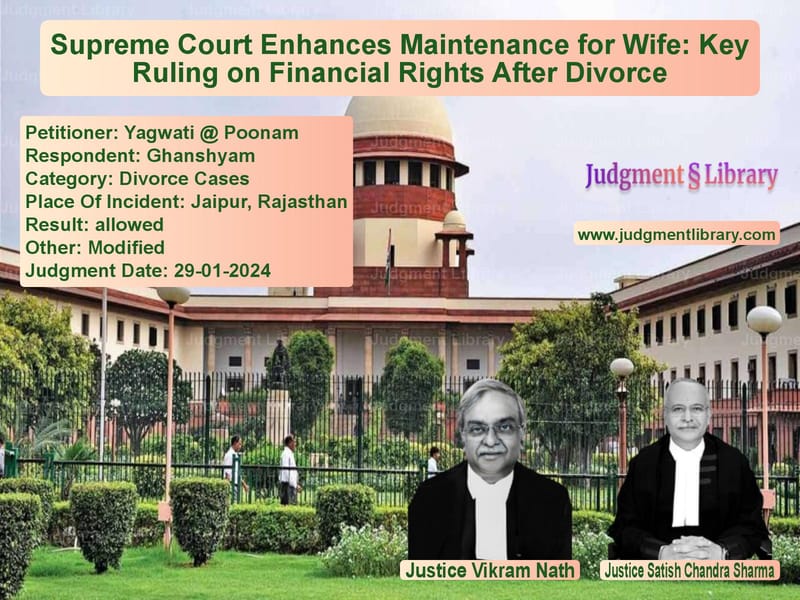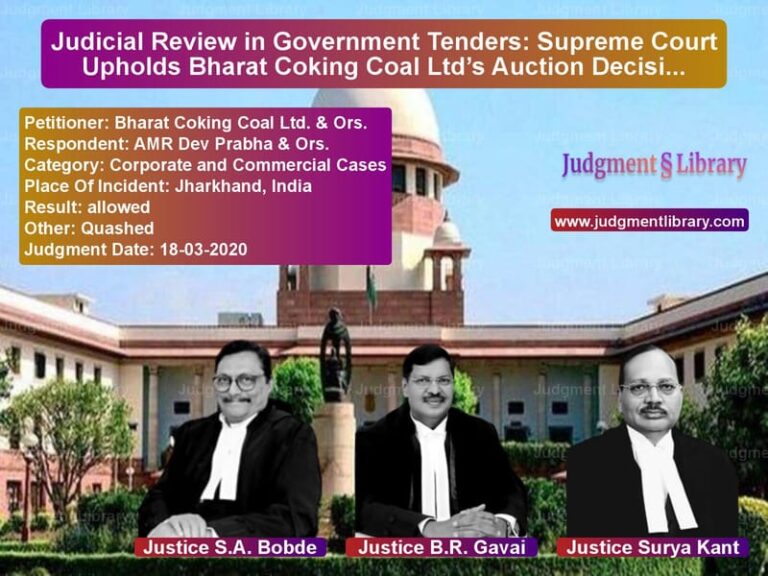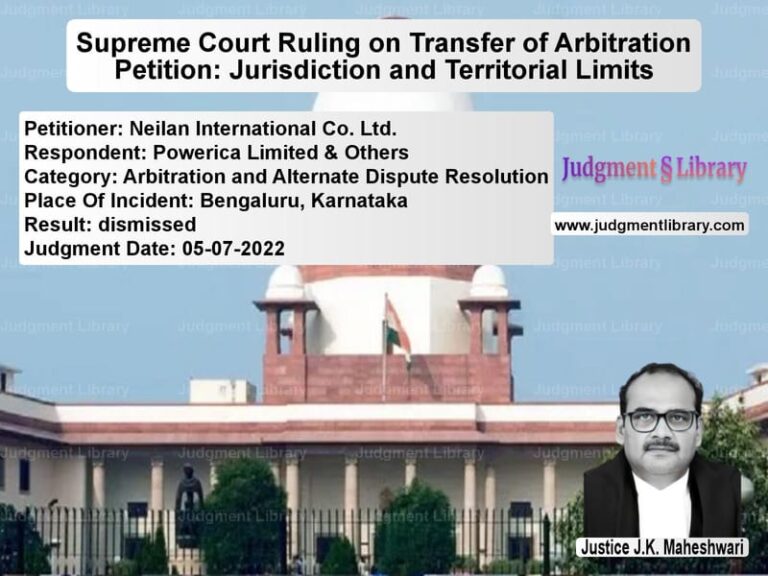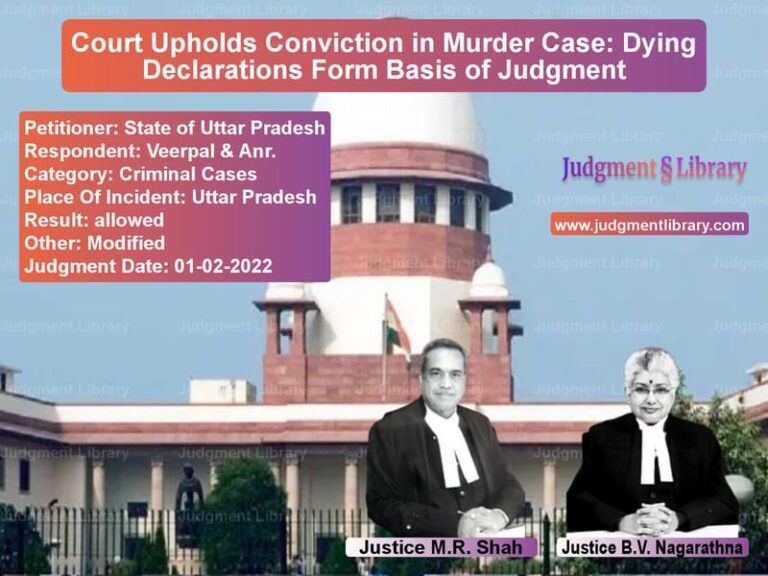Supreme Court Enhances Maintenance for Wife: Key Ruling on Financial Rights After Divorce
The Supreme Court of India, in a crucial ruling, has enhanced the monthly maintenance granted to Yagwati @ Poonam from Rs. 10,000 to Rs. 20,000, ensuring financial security for estranged spouses. The case, Yagwati @ Poonam vs. Ghanshyam, revolves around the financial obligations of a husband post-divorce and the evolving judicial approach toward maintenance under the Hindu Adoption and Maintenance Act, 1956.
Background of the Case
The appellant, Yagwati @ Poonam, and the respondent, Ghanshyam, were married on April 27, 1982. Over the years, the couple had three children: Abhishek, Aashish, and Nikki. However, due to marital discord, the couple separated in 1998. The respondent chose to live with two of the children, leaving the appellant and the youngest daughter, Nikki, to fend for themselves.
In 1998, the respondent filed for divorce under Section 13 of the Hindu Marriage Act, 1955. The Family Court at Jaipur granted an ex-parte divorce decree in favor of the respondent on May 31, 2005. Following the divorce, the respondent remarried in 2007, leaving the appellant without any financial support.
Given her economic condition, the appellant sought maintenance under Section 18 of the Hindu Adoption and Maintenance Act, 1956. The Family Court granted her maintenance of Rs. 3,000 per month in April 2009. Additionally, maintenance for Nikki was set at Rs. 5,000 per month until she reached adulthood.
Legal Battle for Enhanced Maintenance
Unhappy with the low maintenance amount, the appellant challenged the decision before the Rajasthan High Court. The High Court, after reviewing the case, increased the maintenance to:
- Rs. 6,000 per month from May 16, 2009 to December 31, 2005.
- Rs. 10,000 per month from January 1, 2006 onwards.
Despite the increase, the appellant contended that the amount was insufficient considering the respondent’s financial status.
Arguments by the Petitioner (Wife)
The appellant, represented by her counsel, argued:
- The High Court’s enhanced maintenance amount was still insufficient.
- The respondent was employed as an Assistant Manager at Bharat Sanchar Nigam Limited (BSNL) and earning a substantial salary.
- An RTI response revealed that the respondent was earning Rs. 1,05,871 per month.
- The respondent was deliberately avoiding his financial responsibilities despite his strong financial capacity.
- The cost of living had increased significantly, and she needed more financial support to sustain herself.
- The respondent had failed to pay maintenance arrears despite a court order directing him to clear dues within one year.
Arguments by the Respondent (Husband)
The respondent, through his counsel, countered:
- He had retired and was no longer earning a high salary.
- His only source of income was his BSNL pension.
- The maintenance amount granted by the High Court was fair and should not be increased further.
- He had additional financial responsibilities, including supporting his new family.
Supreme Court’s Observations
After hearing both sides, the Supreme Court made the following observations:
“Considering the position of the parties and the totality of circumstances surrounding the present appeal, we are of the considered view that the appellant should be granted a sum of Rs. 20,000 per month as maintenance with effect from the date of this order.”
“The arrears payable in respect of the maintenance due to the appellant shall be payable in equal instalments by the respondent in addition to the regular maintenance.”
“A husband cannot abdicate his financial responsibilities merely because he has retired. The wife, having spent years in marriage and raising children, deserves financial stability.”
Final Judgment
The Supreme Court ruled:
- The monthly maintenance for the appellant was increased from Rs. 10,000 to Rs. 20,000.
- The respondent must pay arrears in equal instalments.
- The Family Court was directed to quantify the total arrears and set a structured repayment plan.
- BSNL was directed to ensure that maintenance payments are deducted from the respondent’s pension and credited directly to the appellant.
Implications of the Judgment
The ruling has major implications for maintenance cases:
- Recognition of Financial Growth: The judgment acknowledges that maintenance should be adjusted based on the financial capacity of the paying spouse.
- Enforcement of Arrears: The decision reinforces the principle that failure to comply with court orders will not be tolerated.
- Protection of Estranged Spouses: The ruling provides clarity on how courts assess maintenance obligations even after retirement.
- Judicial Review of Financial Hardship: The case demonstrates that courts take into account the financial situation of both parties when awarding maintenance.
Conclusion
The Supreme Court’s decision in Yagwati @ Poonam vs. Ghanshyam is a milestone in maintenance law. It ensures that estranged spouses receive fair financial support and prevents husbands from evading financial responsibility after divorce. By linking maintenance payments to the respondent’s pension, the ruling provides a practical enforcement mechanism, ensuring timely and consistent support for the appellant.
The case sets a precedent for future maintenance disputes, reinforcing the judiciary’s commitment to ensuring financial stability for dependent spouses post-divorce.
Petitioner Name: Yagwati @ Poonam.Respondent Name: Ghanshyam.Judgment By: Justice Vikram Nath, Justice Satish Chandra Sharma.Place Of Incident: Jaipur, Rajasthan.Judgment Date: 29-01-2024.
Don’t miss out on the full details! Download the complete judgment in PDF format below and gain valuable insights instantly!
Download Judgment: yagwati-@-poonam-vs-ghanshyam-supreme-court-of-india-judgment-dated-29-01-2024.pdf
Directly Download Judgment: Directly download this Judgment
See all petitions in Alimony and Maintenance
See all petitions in Divorce by Desertion
See all petitions in Property Division in Divorce Cases
See all petitions in Judgment by Vikram Nath
See all petitions in Judgment by Satish Chandra Sharma
See all petitions in allowed
See all petitions in Modified
See all petitions in supreme court of India judgments January 2024
See all petitions in 2024 judgments
See all posts in Divorce Cases Category
See all allowed petitions in Divorce Cases Category
See all Dismissed petitions in Divorce Cases Category
See all partially allowed petitions in Divorce Cases Category







